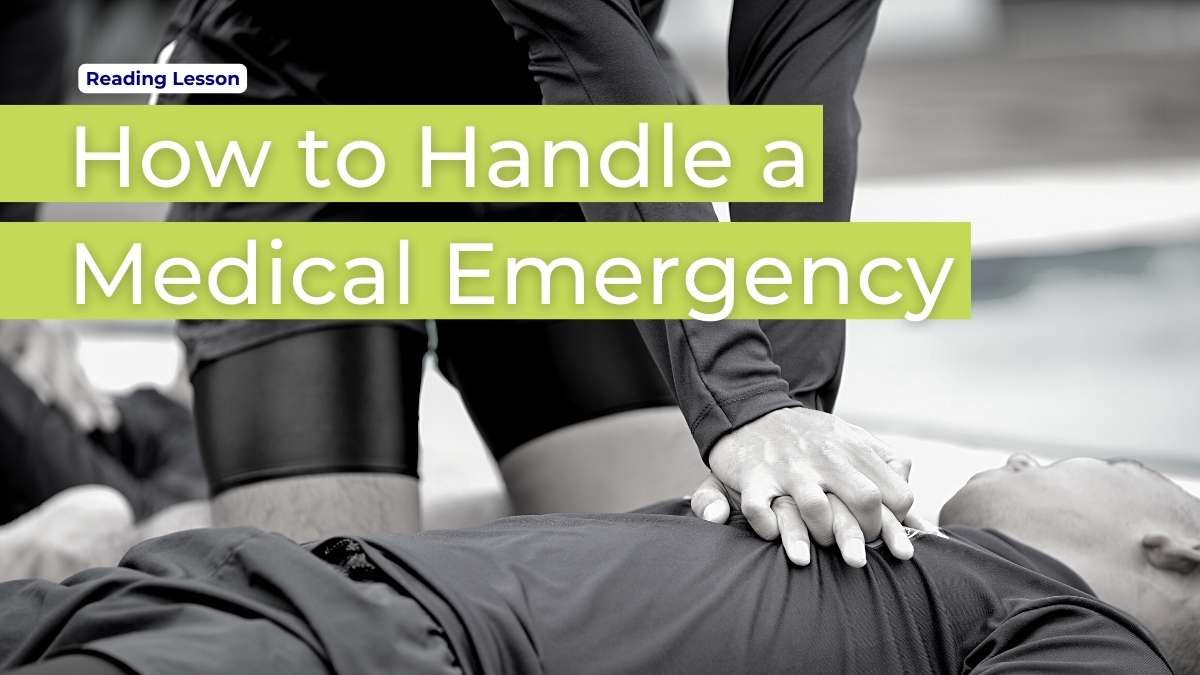Reading lesson: Medical Emergencies

Read this article about how to help in a medical crisis. Then complete the quiz below.
How to Handle a Medical Emergency
Imagine the worst-case scenario – you find an unconscious person. Most people are not trained medical professionals, but that does not mean you cannot help. Follow these steps to handle a medical emergency in the best way possible.
- Call the emergency number for help – common numbers are 112, 911, or 999. Use the correct emergency number for the country where you are. Don’t hesitate because you don’t know how serious the situation is. It is best to call and let professionals decide the next step.
- Remain calm and stay aware. Look for other potential dangers. Don’t create another emergency because you are trying to help someone.
- Start CPR or follow the directions from the emergency dispatcher. They will help you until EMTs arrive on the scene.

Mit dem Laden des Videos stimmen Sie der Übermittlung Ihrer Daten an YouTube zu.
Mehr erfahren
While you wait, you may be able to help more. Here are some more tips to be a good Samaritan.
- Check their alertness. Ask them, “Are you OK?” or “Do you know where you are?”
- Take their pulse. You can do this at their wrist or neck. Do not use your thumb. Instead, use your index and middle finger. Thumbs themselves have a pulse that you can mistake for theirs.
- Stay with them and keep them calm. Tell them emergency services are coming.
- Make them comfortable, if possible. You can offer water or give your coat as a headrest. Do not move an injured person by yourself though. You can cause more problems if there is a back, neck, or head injury.
- Do not slap them, shake them, or try to give them medical treatment on your own.
The best preparation for an emergency is knowledge. Know emergency numbers if you are traveling. Be aware of where you are and what happens around you. Take classes to learn how to give CPR and the Heimlich maneuver for choking.
SOURCES: William Walters, MD, emergency medicine specialist, Temple University School of Medicine, Philadelphia. Elda Ramirez, RN, MSN, FNP, CEN, professor and division head of emergency care, University of Texas School of Nursing, Houston.
Writing Exercise
Reading Comprehension Quiz
Quiz Summary
0 of 10 Questions completed
Questions:
Information
You have already completed the quiz before. Hence you can not start it again.
Quiz is loading…
You must sign in or sign up to start the quiz.
You must first complete the following:
Results
Results
0 of 10 Questions answered correctly
Your time:
Time has elapsed
You have reached 0 of 0 point(s), (0)
Earned Point(s): 0 of 0, (0)
0 Essay(s) Pending (Possible Point(s): 0)
Categories
- Not categorized 0%
- 1
- 2
- 3
- 4
- 5
- 6
- 7
- 8
- 9
- 10
- Current
- Review
- Answered
- Correct
- Incorrect
-
Question 1 of 10
1. Question
True or false:
Always do CPR if you find an unconscious person.
CorrectIncorrect -
Question 2 of 10
2. Question
True or false:
The person’s safety is most important.
CorrectIncorrect -
Question 3 of 10
3. Question
True or false:
Always call for help if you find an unconscious person.
CorrectIncorrect -
Question 4 of 10
4. Question
True or false:
Moving injured people can cause more problems than help.
CorrectIncorrect -
Question 5 of 10
5. Question
True or false:
You can slap a choking person’s back to help them.
CorrectIncorrect -
Question 6 of 10
6. Question
Complete the sentence with the correct term:
Check a person’s ________ in their neck or wrist.
CorrectIncorrect -
-
Question 7 of 10
7. Question
Complete the sentence with the correct term:
When you call the emergency line, the ________ will give you directions.
CorrectIncorrect -
-
Question 8 of 10
8. Question
Complete the sentence with the correct term:
The Heimlich ________ is the procedure for someone who is choking.
CorrectIncorrect -
-
Question 9 of 10
9. Question
Choose the correct option to complete the sentence:
You should always be prepared for medical emergencies …
CorrectIncorrect -
Question 10 of 10
10. Question
Choose the correct answer to complete the sentence:
You can be a(n) ________ by calling for help and offering support to people in medical emergencies.
CorrectIncorrect
